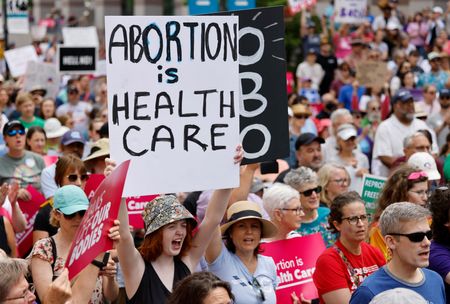 1
1 1
1
By Julia Harte
(Reuters) – South Carolina’s state House on Tuesday began a days-long debate over a bill to ban most abortions after six weeks of pregnancy, while state lawmakers in North Carolina and Nebraska took up separate legislation to restrict abortion in those states.
In North Carolina, the Republican-controlled state legislature voted to override Democratic Governor Roy Cooper’s veto of a bill banning most abortions after 12 weeks, allowing it to become law.
In Nebraska, where lawmakers in April narrowly voted down a ban on most abortions after six weeks, the unicameral legislature was set to debate a bill restricting gender-affirming care for minors that was amended to also prohibit abortions for pregnancies beyond 12 weeks.
The legislative battles underway on Tuesday were the latest in a nationwide wave of Republican-dominated state legislatures that have advanced abortion bans over strong opposition from Democrats since the Supreme Court revoked federal abortion rights in June 2022.
Near-total abortion bans have taken effect in 14 states since the Supreme Court ruling, according to the Guttmacher Institute, an abortion rights advocacy research group.
South Carolina’s House took up the abortion restriction legislation on Tuesday in a special session called by the state’s Republican governor, just weeks after five women in the state Senate banded together to block a proposed near-total abortion ban.
The South Carolina state Senate did pass a six-week abortion ban in February, which failed to become law because it was not passed by the House, where Republicans wanted to push through the near-total ban. The bill under consideration by the state House on Tuesday was a heavily amended version of that measure.
Some South Carolina state Senators who supported the original six-week ban have expressed their opposition to the House version, however, leaving its fate uncertain if the House votes to send it back to the Senate.
Republican Representative John McCravy defended the House bill as an improvement over the Senate version, noting that it toughened penalties for providers who violated the law and required minors to obtain a court order before getting an abortion in the first trimester.
Democratic lawmakers last week filed 1,000 amendments to the House version, ensuring that debate would last for dozens of hours, since lawmakers may speak for six minutes for and against each amendment.
One amendment from Democratic Representative Gilda Cobb-Hunter would have replaced the legislation with a statewide referendum over whether abortion should be protected in the state constitution. Republicans quickly rejected the proposal on Tuesday.
“What are y’all afraid of?” asked Cobb-Hunter. “Why won’t you allow the voters to tell you what you claim … they believe?”
(Reporting by Julia Harte; Editing by Deepa Babington)